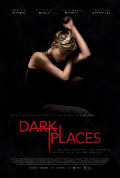
Directed by
Gilles Paquet-Brenner
114 minutes
Rated M
Reviewed by
Bernard Hemingway

Dark Places
A thriller-cum-character study, Dark Places, which was scripted by director Gilles Paquet-Brenner from a novel by Gillian Flynn is a much more convincing affair than was Gone Girl (2014) which was directed by David Fincher from a script by Flynn based on her own novel. Better in that instead of a slick high-end thriller that doesn’t really hold together we get a film that genuinely takes us to dark places, these being in the mind of the central character, played as an adult by Charlize Theron.
Theron plays Libby who 25 years earlier witnessed the murder of her entire family, single mother Patty (Christina Hendricks) and her older sisters, Michelle (Natalie Precht) and Debby (Madison McGuire, and named her brother, Ben (Tye Sheridan as a teenager, Corey Stoll as an adult), as the killer. She is approached by a group of nerds who devote themselves to investigating unsolved crimes and what they believe to be miscarriages of justice. The group believe that Ben is innocent although he has never protested his conviction. As the case is about to be closed, the group approach Libby, a taciturnly defensive creature, and requests her to get involved in a last ditch attempt to free Ben . Libby doesn’t want to but as she is cash-strapped accepts the offer of payment from their spokesperson, Lyle (Nicholas Hoult). The film switches between two time frames: the present in which Libby is trying to get close to the truth of the matter (which as the opening scene of her being primed by an unseen interlocuter suggests is not what as a child, played by Sterling Jerins, she testified to); and the past, in which, bit by bit, the truth unfolds.
The latter part provides the traditional who-dunnit material and this is convincingly done without the kind of ludicrous plot holes that marred Gone Girl but it is the present, thanks to Theron’s fine performance, that really gives the film the depth that, once again, Fincher’s film lacked. Theron shines as an unlikeable character – suspicious and hostile – but who, once having taken on her task, executes it with believable commitment and even a gradual yielding of her defences. Once again, and unlike Gone Girl, there is credibility to the characters’ behaviour with Paquet-Brenner keeping the film, including the violence, within the parameters of believability (at least for a thriller), thus providing satisfactions that Fincher’s glossier but emptier showmanship did not.
Available from: Village Roadshow
Want something different?





